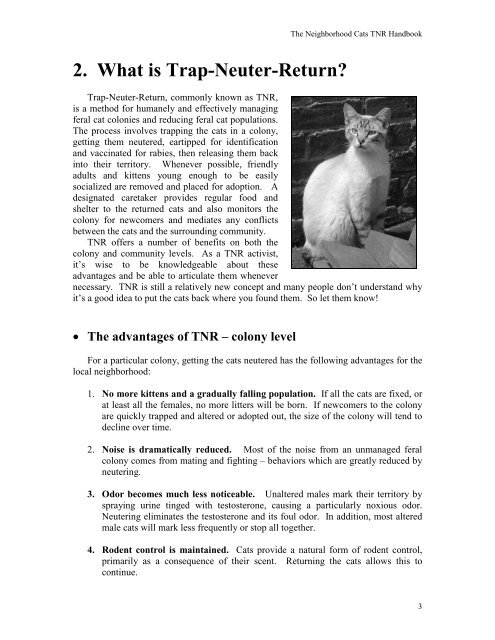Create successful ePaper yourself
Turn your PDF publications into a flip-book with our unique Google optimized e-Paper software.
2. What is Trap-Neuter-Return?<br />
The <strong>Neighborhood</strong> <strong>Cats</strong> <strong>TNR</strong> <strong>Handbook</strong><br />
Trap-Neuter-Return, commonly known as <strong>TNR</strong>,<br />
is a method for humanely and effectively managing<br />
feral cat colonies and reducing feral cat populations.<br />
The process involves trapping the cats in a colony,<br />
getting them neutered, eartipped for identification<br />
and vaccinated for rabies, then releasing them back<br />
into their territory. Whenever possible, friendly<br />
adults and kittens young enough to be easily<br />
socialized are removed and placed for adoption. A<br />
designated caretaker provides regular food and<br />
shelter to the returned cats and also monitors the<br />
colony for newcomers and mediates any conflicts<br />
between the cats and the surrounding community.<br />
<strong>TNR</strong> offers a number of benefits on both the<br />
colony and community levels. As a <strong>TNR</strong> activist,<br />
it’s wise to be knowledgeable about these<br />
advantages and be able to articulate them whenever<br />
necessary. <strong>TNR</strong> is still a relatively new concept and many people don’t understand why<br />
it’s a good idea to put the cats back where you found them. So let them know!<br />
• The advantages of <strong>TNR</strong> – colony level<br />
For a particular colony, getting the cats neutered has the following advantages for the<br />
local neighborhood:<br />
1. No more kittens and a gradually falling population. If all the cats are fixed, or<br />
at least all the females, no more litters will be born. If newcomers to the colony<br />
are quickly trapped and altered or adopted out, the size of the colony will tend to<br />
decline over time.<br />
2. Noise is dramatically reduced. Most of the noise from an unmanaged feral<br />
colony comes from mating and fighting – behaviors which are greatly reduced by<br />
neutering.<br />
3. Odor becomes much less noticeable. Unaltered males mark their territory by<br />
spraying urine tinged with testosterone, causing a particularly noxious odor.<br />
Neutering eliminates the testosterone and its foul odor. In addition, most altered<br />
male cats will mark less frequently or stop all together.<br />
4. Rodent control is maintained. <strong>Cats</strong> provide a natural form of rodent control,<br />
primarily as a consequence of their scent. Returning the cats allows this to<br />
continue.<br />
3


